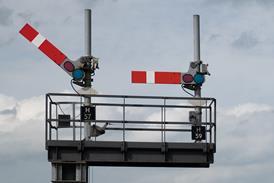MICHAEL COSTA, Minister for Transport Services in New South Wales, released on August 14 a letter to EDI Rail, supplier of Sydney’s Millennium EMUs, informing the company that the state government would suspend payments for the double-deck suburban trains until technical problems with on-board computer systems had been resolved. Telling local reporters that ’the public has had enough ... I’ve had enough’, Costa also announced that a decision about exercising an option for a third build of 60 Millennium cars had been postponed until April next year.
Trouble was brewing even before the first four-car set carried fare-paying passengers in Sydney on July 1 2002. Late delivery was causing concern, exacerbated by the state government pressing to have the trains running ahead of an impending election. Predictably, this led to problems, and all 11 of the initial fleet of 20 sets that had entered service had to be withdrawn on April 10 2003 for more testing. Difficulties identified included interference with signalling equipment that locked a signal at red after a train had passed, traction system trip-outs and various software problems that affected doors, communications and air-conditioning.
The problems were ostensibly rectified, allowing the EMUs to return to service on June 2. Alas, the bugs quickly resurfaced, and by August 12 there had been 24 more incidents, triggering delays across the suburban network.
On June 17 the Director General of Transport commissioned a technical assessment of State Rail’s management of the problems with the Millennium fleet from Chris McKeown, a senior engineer with Victoria’s Department of Infrastructure. In his report, McKeown drew comparisons with the two recent builds of suburban rolling stock for Melbourne, and in particular questioned the effectiveness of the units’ Train Management System. He concluded that this ’key subsystem is present in many of the fault types’ and asked if the ’increased capital cost and technology risk from a Train Management System is justified by the benefits’.
Another issue to emerge was the weak power supply on parts of the 1·5 kV DC Sydney suburban network, causing high-voltage circuit breakers to open in the substations because of current overloads. This has meant restricting the routes over which the Millennium trains can run.
McKeown’s review was the second formal report about the Millennium fleet. In June 2003 the NSWAuditor-General Bob Sendt had released his own assessment of the trains. While commenting that ’much about the Millennium train is impressive’, Sendt criticised the SRA board and the Minister for Transport for not being ’timely in approving the tendering’, so that ’the purchase timetable was aggressive and created expectations which were not met’. The contractual delivery date for the launch train was January 4 2001, but it did not achieve ’practical completion’ until June 28 2002. On that date the train was recorded as having 465 defects that would be accepted, plus a further 545 needing to be rectified. One issue was that the EMUs were 30 tonnes heavier than specified, while the total project cost had risen by 17% to A$658m.
In a response to the public release of Costa’s letter, Stephen Gillies, Managing Director of Downer EDI, parent company of EDI Rail, said on August 14 that the firm stood by its product and ’was working intensely with its principal supplier Alstom and State Rail to resolve problems relating to the train.’ Gillies added that ’it was disappointing that the government and State Rail seemed to be pursuing a course which was contractually-driven and based on public threats.’ He insisted that ’the train does not have any endemic problems with componentry’ - these had ’largely been fixed or are well on the way to being fixed’. On the TMS, Gillies said that ’we are undertaking a complete review’, remarking that the problems ’are analogous to glitches in computer operating systems. On-going operation of the trains will iron out these bugs.’
While these difficulties will probably be solved with time, the saga highlights more fundamental problems that relate to the SRA writing over-sophisticated specifications - Sendt’s audit report said that SRA had been ’too specific’, and we understand that some bidders refused to comply with many of the clauses. In a competitive world with huge pressure to cut capital and operating costs for new trains, such a policy is asking for trouble.




















